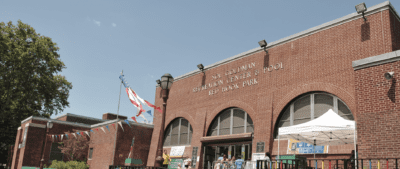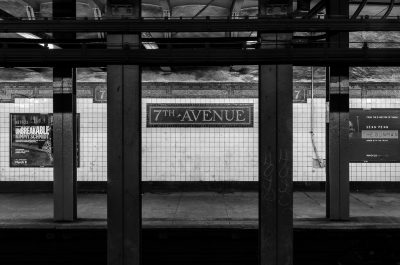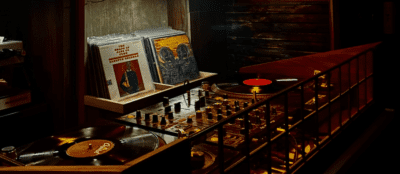(Courtesy Christine Alcalay)
‘Beauty in these differences’: Christine Alcalay weaves heritage into modernity
The designer discusses her Vietnamese roots — and shares her favorite Brooklyn-based AAPI-owned businesses
The Lunar New Year is a holiday of renewal and growth. But for Vietnamese designer and founder Christine Alcalay, embracing her heritage wasn’t always second nature.
Alcalay moved to Brooklyn with her mother at 2, and as she got older, she often felt disconnected from her family’s cultural traditions. As Alcalay matured, though, she found herself naturally leaning on her upbringing as a means of comfort.
When she founded her namesake fashion brand in 2014, Alcalay witnessed herself intuitively integrating Vietnamese cultural nods into her designs — such as vibrant colors and graceful silhouettes. Her garments, from structured, tailored trench coats to signature flouncy dresses, are all manufactured locally and exude a sense of understated boldness.
After opening a flagship boutique in Park Slope just last year — the third location under her belt, as she owns another boutique, Kiwi, and a menswear location called Fig — the designer finally feels as though she’s blended her Vietnamese roots with the region that shaped her.
Brooklyn Magazine caught up with the Brooklyn-based designer ahead of the Lunar New Year to discuss her favorite traditions — one of which, giving out flowers, she’ll bring to her namesake boutique in honor of the holiday. She also shares her favorite AAPI-owned spots in Brooklyn.
You have said that you create clothing for “the woman who has a story to tell.” What is your story? Tell me about how you infuse both your Vietnamese background and your upbringing in New York into your designs.
I use clothing and fashion as the storytelling element of my brand. My mom and I came here from Vietnam when I was very young and she was trying to build a home and a life for us. So at the same time that I was learning English, I was also right beside her learning how to sew, learning about clothing, and all of the different sides of fashion. It was like a second language to me. I was in factories watching my mom provide a life for us. It was very inspiring to me and I always look at her as someone who is such a hard worker. Now I tell that story and continue what she started. I often feel like I didn’t really have a ton of a choice. It was something that she started and it was my responsibility to take it to the next step and continue telling that story in my way — the story of who we are as Americans.
How does your family influence your craft still today?
My family is always influencing my craft. I grew up in Queens and we were like the only Vietnamese family in our neighborhood. My mom didn’t speak a ton of English at that point, so our entire culture was Vietnamese food and Vietnamese tradition. So it’s always inside of me. Sometimes I don’t think that I realize it as much, but then it’ll come through in the silhouettes — Vietnamese silhouettes are tighter on top and very billowy on the bottom. There are a lot of layers as well as sheer and opaque elements. So if you look at my line, there’s a lot of that flowing through it, and a lot of color because Vietnamese fashion is very colorful and it’s a tropical place. There’s a very diaphanous quality in my pieces.
And then there’s the other part of being an Asian American — this idea of, “What does the professional woman look like? What does she look like if she’s successful?” So I juxtaposed those carefree Vietnamese design elements with my idea of what the modern American woman’s success would look like.
What are some of your favorite Lunar New Year traditions?
As I’m getting older, the traditions become even more important. When I was little and growing up in Queens, I was not as open to the traditions — especially the Lunar New Year because I kind of felt like we were the outcasts. So anything that I had to do to assimilate to be like everyone else, I did. As I’m getting older and raising my own kids, I have realized the beauty of the traditions. For a long time, I wanted to be like everyone else. But as time has gone on, I’ve found beauty in these differences. I want my kids to understand what their identity means as well. So something that I didn’t want for the longest time has become extremely important to me.
How do you pay that homage to your heritage?
When we get together, we have certain traditions that we embrace, like you should always wear new clothing on the Lunar New Year. Everyone has a new outfit and it allows me to dress up my entire family in all new clothes. Another tradition is that you’re not supposed to cook or clean on New Year’s as well. Because anything that you do on the day of New Year, you will do for the rest of the year. So there’s a lot of relaxing and eating. When I was little, one of my fondest memories was collecting red envelopes given to me by older members of my family. The holiday is really about family, food and gathering together. And there were always so many stories. The Lunar New Year is the biggest holiday for the Vietnamese. I have realized that it is in our traditions that we define who we are and where we come from. I want my kids to be proud of that.
What are some Lunar New Year essentials for you — any special party-hosting tips or pieces of clothing that really make the holiday special for you?
The biggest thing is always wherever you go when you’re going to a Lunar New Year celebration, you always come with gifts. I usually bring a ton of oranges or other fruits. The language of love for the Vietnamese is definitely food. So it’s always about food, but other than that it’s less “things” focused and more like items and food that bring abundance and joy. It’s about the offering part of it and giving.
View this post on Instagram
We asked Alcalay to share a few of her favorite AAPI-owned spots around the borough. Here are her picks:
In Common With
124 9th Street, Suite 270, Park Slope
“In Common With is a lighting design studio that I’m currently obsessing over,” Alcalay says. Offering sleek, aesthetically pleasing lighting fixtures, the Park Slope-based storefront is all about community. The founders collaborate with glassblowers, ceramicists and artisanal experts to create both signature and custom designs.
Bạn Bè
187 Sackett Street, Cobble Hill
Alcalay’s favorite spot to pick up traditional Vietnamese confections, Bạn Bè is New York’s first Vietnamese bakery. Located in Carroll Gardens, the bakery, which also offers heavier options like banh mi, is the authority for jelly cake, Bánh bò nướng, and more.
Ba Xuyên
4222 8th Avenue, Sunset Park
Ba Xuyên is assuming from the outside, but Alcalay swears by the banh mi. “It’s my go-to, as well as the avocado shakes and cassava cakes,” she says. The unadorned restaurant has become a local favorite spot for delicious sandwiches and starter dishes.
Phở Vietnam
1243 Avenue U, Homecrest
Alcalay mentioned having trouble finding a staple phở spot — that is until she discovered Phở Vietnam on Avenue U. On nights when she wants to share a no-fuss comforting meal with her family, this is the designer’s favorite dependable takeout spot.
Haenyo
239 5th Avenue, Park Slope
Encapsulating Korean home cooking, Haenyo serves up traditional fare — from dukboki to bulgogi. The restaurant Park Slope-based eatery is a spot Alcalay likes to visit often in the summer, to enjoy their summery, fresh cocktails outside.
Kiwi, Fig, and Christine Alcalay
Christine Alcalay: 316 5th Avenue
“Of course, my boutiques!” she says. Of course.
You might also like 


























